#Healthcare Artificial Intelligence Market
Text
1 note
·
View note
Text

TOP 10 courses that have generally been in high demand in 2024-
Data Science and Machine Learning: Skills in data analysis, machine learning, and artificial intelligence are highly sought after in various industries.
Cybersecurity: With the increasing frequency of cyber threats, cybersecurity skills are crucial to protect sensitive information.
Cloud Computing: As businesses transition to cloud-based solutions, professionals with expertise in cloud computing, like AWS or Azure, are in high demand.
Digital Marketing: In the age of online businesses, digital marketing skills, including SEO, social media marketing, and content marketing, are highly valued.
Programming and Software Development: Proficiency in programming languages and software development skills continue to be in high demand across industries.
Healthcare and Nursing: Courses related to healthcare and nursing, especially those addressing specific needs like telemedicine, have seen increased demand.
Project Management: Project management skills are crucial in various sectors, and certifications like PMP (Project Management Professional) are highly valued.
Artificial Intelligence (AI) and Robotics: AI and robotics courses are sought after as businesses explore automation and intelligent technologies.
Blockchain Technology: With applications beyond cryptocurrencies, blockchain technology courses are gaining popularity in various sectors, including finance and supply chain.
Environmental Science and Sustainability: Courses focusing on environmental sustainability and green technologies are increasingly relevant in addressing global challenges.
Join Now
learn more -
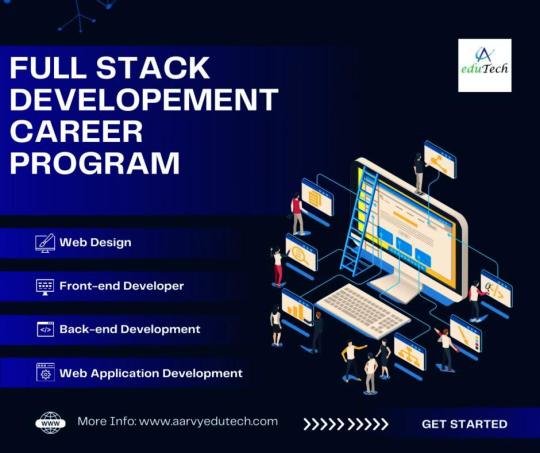
#artificial intelligence#html#coding#machine learning#python#programming#indiedev#rpg maker#devlog#linux#digital marketing#top 10 high demand course#Data Science courses#Machine Learning training#Cybersecurity certifications#Cloud Computing courses#Digital Marketing classes#Programming languages tutorials#Software Development courses#Healthcare and Nursing programs#Project Management certification#Artificial Intelligence courses#Robotics training#Blockchain Technology classes#Environmental Science education#Sustainability courses
2 notes
·
View notes
Text
Generative AI in Healthcare Market to Grow at an 35.1% CAGR Till 2032!
The global Generative AI in Healthcare Market worth USD 1.07 billion in 2023 is likely to be USD 21.74 billion by 2032, growing at a 35.1% CAGR between 2023 and 2032.
According to the stats published by World Health Organization (WHO), approximately 1.28 million adults (between 30 and 79 years of age) have hypertension. Of these, as little as 42% of adults are diagnosed and treated correctly and the remaining population is unaware of this condition. The majority of this population resides in low to middle-income countries of the world. Despite this substantial number of untreated cases, the rising awareness among doctors and the general population regarding health illnesses associated with hypertension is expected to drive the demand for the required devices.
Download White Paper@ https://www.towardshealthcare.com/personalized-scope/5069
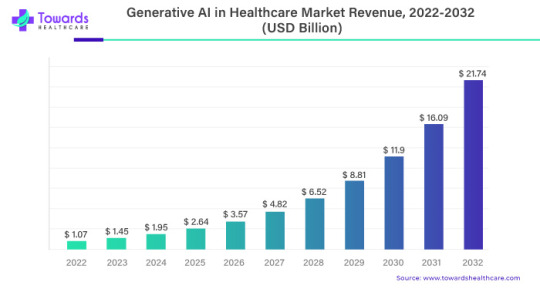
A recent report provides crucial insights along with application based and forecast information in the Global Generative AI in Healthcare Market. The report provides a comprehensive analysis of key factors that are expected to drive the growth of this Market. This study also provides a detailed overview of the opportunities along with the current trends observed in the Generative AI in Healthcare Market.
A quantitative analysis of the industry is compiled for a period of 10 years in order to assist players to grow in the Market. Insights on specific revenue figures generated are also given in the report, along with projected revenue at the end of the forecast period.
Report Objectives
To define, describe, and forecast the global Generative AI in Healthcare Market based on product, and region
To provide detailed information regarding the major factors influencing the growth of the Market (drivers, opportunities, and industry-specific challenges)
To strategically analyze microMarkets1 with respect to individual growth trends, future prospects, and contributions to the total Market
To analyze opportunities in the Market for stakeholders and provide details of the competitive landscape for Market leaders
To forecast the size of Market segments with respect to four main regions—North America, Europe, Asia Pacific and the Rest of the World (RoW)2
To strategically profile key players and comprehensively analyze their product portfolios, Market shares, and core competencies3
To track and analyze competitive developments such as acquisitions, expansions, new product launches, and partnerships in the Generative AI in Healthcare Market
Companies and Manufacturers Covered
The study covers key players operating in the Market along with prime schemes and strategies implemented by each player to hold high positions in the industry. Such a tough vendor landscape provides a competitive outlook of the industry, consequently existing as a key insight. These insights were thoroughly analysed and prime business strategies and products that offer high revenue generation capacities were identified. Key players of the global Generative AI in Healthcare Market are included as given below:
Generative AI in Healthcare Market Key Players:
Syntegra
NioyaTech
Saxon
IBM Watson
Microsoft Corporation
Google LLC
Tencent Holdings Ltd.
Neuralink Corporation
OpenAI
Oracle
Market Segments :
By Application
Clinical
Cardiovascular
Dermatology
Infectious Disease
Oncology
Others
System
Disease Diagnosis
Telemedicine
Electronic Health Records
Drug Interaction
By Function
AI-Assisted Robotic Surgery
Virtual Nursing Assistants
Aid Clinical Judgment/Diagnosis
Workflow & Administrative Tasks
Image Analysis
By End User
Hospitals & Clinics
Clinical Research
Healthcare Organizations
Diagnostic Centers
Others
By Geography
North America
Europe
Asia-Pacific
Latin America
Middle East and Africa
Contact US -
Towards Healthcare
Web: https://www.towardshealthcare.com/
You can place an order or ask any questions, please feel free to contact at
Email: [email protected]
About Us
We are a global strategy consulting firm that assists business leaders in gaining a competitive edge and accelerating growth. We are a provider of technological solutions, clinical research services, and advanced analytics to the healthcare sector, committed to forming creative connections that result in actionable insights and creative innovations.
#seo marketing#seo#market analysis#market share#marketing#ai#artificial intelligence#Generative AI#healthcare
2 notes
·
View notes
Text
10 Innovative Business Ideas That You Can Start Today using AI
Are you tired of the same old business ideas? Are you looking for something innovative and exciting that can set you apart from the competition? Look no further than AI!
Artificial Intelligence (AI) is transforming the business world, and there are countless opportunities for entrepreneurs to capitalize on this emerging technology.
Here are 10 innovative business ideas that you can start today using AI:

Virtual personal shopping assistant: Use AI to create a personalized shopping experience for your customers.
Predictive analytics for sales: Use AI to predict sales trends and adjust your inventory and pricing accordingly.
Automated customer service chatbot: Use AI to provide 24/7 customer service and support.
Voice-activated smart home installation and setup: Use AI to install and set up smart home devices for customers.
AI-powered financial planning and investment advice: Use AI to analyze financial data and provide customized investment advice.
Personalized nutrition and exercise planning: Use AI to create customized nutrition and exercise plans for customers.
Predictive maintenance for equipment: Use AI to predict when equipment will need maintenance or repairs, reducing downtime and saving money.
Automated document classification and organization: Use AI to automatically classify and organize documents for businesses.
AI-powered fraud detection: Use AI to detect and prevent fraud in financial transactions.
Predictive analytics for healthcare: Use AI to analyze patient data and predict healthcare outcomes, improving patient care and reducing costs.
These are just a few examples of the innovative business ideas that are possible with AI. With the right idea and a little creativity, the possibilities are endless.
So, what are you waiting for? Start brainstorming your own AI-powered business idea today! And remember, the key to success is to be innovative, creative, and always stay one step ahead of the competition.
#my writing#marketing#AI#artificial intelligence#digital marketing#e-commerce#business services#entrepreneurship#innovation#predictive analytics#customer service#smart home#healthcare#fraud detection#chatgtp
4 notes
·
View notes
Text
Unlock the future of marketing with AI-driven audience segmentation! 🎯 Daniel Reitberg dives into how AI is revolutionizing ad targeting for unmatched precision and impact. #AI #Marketing #AdTargeting Daniel Reitberg
#artificial intelligence#machine learning#deep learning#technology#robotics#autonomous vehicles#robots#collaborative robots#business#healthcare#digital marketing#marketing strategy#marketing
0 notes
Text
Artificial Intelligence in Operating Room Market is significantly growing due to the transformation AI is bringing in the field of surgery, bringing significant benefits to both patients and surgeons. The operating room is now a treasure trove of data, ripe for the transformative potential of Artificial Intelligence.
#Artificial Intelligence in Operating Room Market#Artificial Intelligence in Operating Room Report#Artificial Intelligence in Operating Room Industry#AI in Operating Room Market#Healthcare#BISResearch
0 notes
Text
Navigating the Future of Pharma: How BizMagnets Outperforms Tata 1mg ?
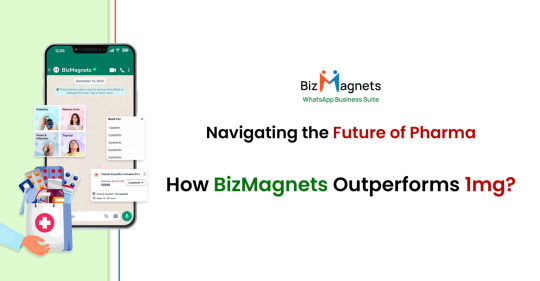
Ready to boost your Business with BizMagnets ?
Contact us for a demo, and let’s start your journey towards enhanced customer engagement, streamlined processes, and increased revenue.
Introduction:
In a time when digital platforms are changing how people access healthcare, pharmacies need to use new and innovative solutions to stay ahead in the market. 1mg has been a leader in providing digital pharmacy services, but a new platform called BizMagnets WhatsApp Business Suite is offering an interesting alternative, especially when it comes to providing personalized and efficient customer service
The Advantage of the WhatsApp Business API
WhatsApp has a huge number of users all around the world, which makes it a great way for pharmacies to communicate with and engage their customers in a more personal way. The BizMagnets suite, which uses the WhatsApp Business API, allows pharmacies to not only reach their customers but also really connect with them. This can provide services that go beyond what other online pharmacy platforms like 1mg currently offer.
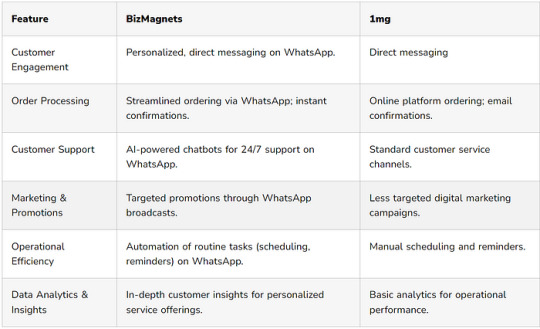
How WhatsApp Business API Can Transform Your Pharmacy Business ?
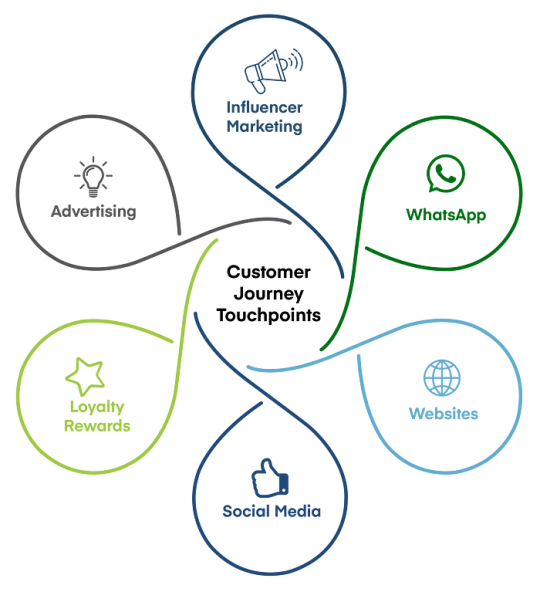
1. Personalized Customer Journeys : The BizMagnets platform uses AI to provide each customer with a customized experience, which can help build customer loyalty and encourage repeat business, unlike the more generic interactions on platforms like 1mg.
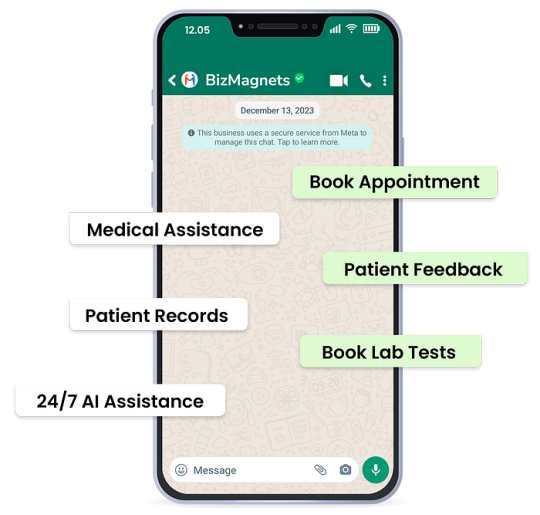
2. Efficient Operations : Automating tasks like appointment booking, test scheduling, and order confirmations through WhatsApp can save time and reduce errors, making pharmacy operations more efficient.
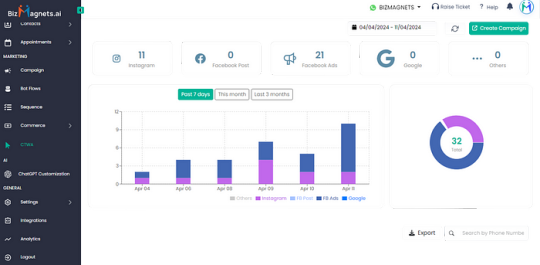
3. Data-Driven Decisions : The advanced analytics capabilities of the BizMagnets platform allow pharmacies to gain valuable insights into customer behavior, which they can then use to make more informed business decisions and tailor their services more precisely
Provoking Thoughts
How could personalized WhatsApp messages transform your pharmacy’s customer service experience?
Imagine the efficiency gains from automating routine operations through WhatsApp. How would that change the day-to-day of your pharmacy?
With the insights provided by BizMagnets, what new services or products could you offer to meet the unique needs of your customers?
For a more in-depth analysis on how the WhatsApp Business API can empower pharmacies to outshine competitors like Tata 1mg through specific features like WhatsApp broadcast, drip campaigns, and Click to WhatsApp ads, let’s expand on each of these components, highlighting their benefits and potential impact on business growth
WhatsApp Broadcast: The Power of Personalized Messaging at Scale
WhatsApp Broadcast allows businesses to send messages to multiple customers at once, provided the customers have saved the business’s phone number in their contacts and have agreed to receive messages. This feature is pivotal for pharmacies in announcing new health products, vaccine availability, or seasonal health tips directly through WhatsApp, ensuring high visibility and engagement. Unlike 1mg’s approach, which may rely more on app notifications or emails, WhatsApp broadcasts feel more personal and are likely to be read by customers
Drip Campaigns: Nurturing Customer Relationships Over Time
Drip campaigns are automated sets of messages that are sent out based on specific timelines or user actions. For pharmacies leveraging BizMagnets, this means being able to automatically send a welcome series to new subscribers, educational content on managing chronic conditions, or reminders for prescription refills. This strategic communication keeps the pharmacy top of mind for customers and can encourage repeat purchases. Drip campaigns through WhatsApp can be more effective than traditional methods used by companies like Tata 1mg, due to the personal and immediate nature of messagingw
Click to WhatsApp Ads: Driving Conversations and Conversions
Click to WhatsApp ads are a powerful tool that integrates with Facebook and Instagram advertising platforms. When users click on an ad, they are directly taken to a WhatsApp conversation with the business. For pharmacies, this means being able to advertise specific products or health services and instantly engage with interested customers, providing personalized advice or facilitating orders directly through WhatsApp. This immediate engagement model can significantly outperform the more static online purchasing experience offered by platforms like 1mg, leading to higher conversion rates and customer satisfaction
The Competitive Edge
Implementing these features through the WhatsApp Business API offers a dynamic and interactive customer experience that stands in contrast to the more traditional, website-centric approach of competitors like 1mg
Here’s how:
Enhanced Personalization: WhatsApp allows for direct, one-on-one communication, making each customer feel valued and understood.
Higher Engagement Rates: Messages on WhatsApp have a higher open and read rate compared to emails and app notifications.
Path to Purchase: By reducing the steps needed to inquire or purchase, customers are more likely to complete transactions.
Empowering Businesses to Thrive in the Digital Age with BizMagnets
In today’s fast-paced, technology-driven business world, adapting and innovating is crucial. By partnering with BizMagnets and leveraging the power of the WhatsApp Business API, companies can gain a significant competitive edge. The BizMagnets.ai platform offers an AI-driven WhatsApp Business Suite that empowers businesses to provide personalized, efficient, and seamless customer communication.
This innovative solution allows companies to meet their customers where they are and deliver a superior customer experience It can gather essential information from leads based on predefined criteria, ensuring that sales teams focus their efforts on high-potential prospects.
Visit: https://bizmagnets.ai/navigating-the-future-of-pharma-how-bizmagnets-outperforms-1mg-with-bizmagnets/
Email: [email protected]
Contact Number: 7845079333
#tata 1mg#medical chatbot#pharmacy#health#technology#whatsapp api#chatbot#whatsapp business#whatsapp api provider#whatsapp flows#business#chatgpt#healthcare chatbots market#whatsapp business api#saas#b2b saas#saas technology#saas software#artificial intelligence#tata#1mg
0 notes
Text
How AI is Transforming Recruitment: What You Need to Know

The recruitment landscape is undergoing a significant transformation, driven by advancements in Artificial Intelligence (AI). The integration of AI into recruitment processes is revolutionising how companies attract, evaluate, and hire talent. This article delves deep into the various ways AI is reshaping the recruitment industry, highlighting the key benefits and considerations for organisations aiming to stay ahead in the competitive job market.
Understanding AI in Recruitment
Artificial Intelligence encompasses a broad range of technologies, including machine learning, natural language processing, and data analytics. In recruitment, AI leverages these technologies to automate repetitive tasks, enhance decision-making, and improve the overall candidate experience.
AI-Powered Resume Screening
One of the most time-consuming aspects of recruitment is resume screening. Traditional methods involve manually sifting through hundreds, if not thousands, of resumes to identify suitable candidates. AI streamlines this process by using algorithms to scan resumes for specific keywords, skills, and qualifications. This not only accelerates the screening process but also reduces human bias, ensuring a more objective selection of candidates.
Enhanced Candidate Sourcing
AI-driven tools are adept at sourcing candidates from a variety of platforms, including job boards, social media, and professional networks. By analysing vast amounts of data, AI can identify passive candidates who may not be actively seeking a job but possess the desired skills and experience. This proactive approach to candidate sourcing significantly widens the talent pool and enhances the quality of hires.
Predictive Analytics in Recruitment
Predictive analytics is another powerful application of AI in recruitment. By analysing historical hiring data, AI can predict which candidates are most likely to succeed in a given role. This involves assessing various factors such as past performance, educational background, and career progression. Predictive analytics enables recruiters to make data-driven decisions, ultimately improving the quality of hires and reducing turnover rates.
AI-Driven Candidate Assessment
Assessing candidates accurately is crucial for making informed hiring decisions. AI offers a range of tools and techniques to enhance candidate assessment, ensuring a comprehensive evaluation of each applicant.
Automated Interview Scheduling
Coordinating interview schedules between recruiters and candidates can be a logistical nightmare. AI simplifies this process by automating interview scheduling, sending reminders, and even conducting initial video interviews. This not only saves time but also ensures a seamless experience for candidates, reflecting positively on the employer brand.
AI-Based Skills Assessment
AI-driven platforms can administer and evaluate skills assessments, providing an objective measure of a candidate's abilities. These assessments can range from technical skills tests to situational judgement tests, offering a holistic view of a candidate's capabilities. The use of AI in skills assessment ensures consistency and fairness, reducing the risk of human bias.
Sentiment Analysis in Interviews
AI-powered sentiment analysis tools can evaluate candidates' responses during interviews, analysing tone, language, and facial expressions. This provides deeper insights into candidates' attitudes, confidence levels, and cultural fit. While human judgement remains essential, sentiment analysis adds an additional layer of evaluation, supporting more informed decision-making.
Improving Candidate Experience with AI
The candidate experience is a critical aspect of recruitment that significantly impacts employer branding. AI plays a pivotal role in enhancing the candidate experience, making the recruitment process more engaging and efficient.
Chatbots for Candidate Engagement
AI chatbots are increasingly being used to engage with candidates throughout the recruitment process. These chatbots can answer frequently asked questions, provide updates on application status, and even conduct initial screenings. By offering instant, 24/7 support, chatbots enhance candidate satisfaction and streamline communication.
Personalised Job Recommendations
AI algorithms can analyse candidates' profiles and job preferences to offer personalised job recommendations. This not only helps candidates find roles that align with their skills and interests but also increases the likelihood of successful placements. Personalised job recommendations enhance the candidate experience by making the job search process more targeted and efficient.
Feedback and Follow-Up Automation
Providing timely feedback and follow-up is essential for maintaining a positive candidate experience. AI can automate these processes, ensuring candidates receive feedback promptly and are kept informed about the status of their applications. This level of engagement demonstrates respect for candidates' time and effort, fostering a positive impression of the organisation.
Ethical Considerations and Challenges
While the benefits of AI in recruitment are substantial, it is essential to address the ethical considerations and challenges associated with its implementation.
Bias and Fairness
AI algorithms are only as unbiased as the data they are trained on. If historical hiring data contains biases, these can be perpetuated by AI systems. It is crucial for organisations to regularly audit and update their AI tools to ensure fairness and minimise bias. Transparency in AI decision-making processes is also vital for building trust with candidates and stakeholders.
Data Privacy and Security
The use of AI in recruitment involves the collection and analysis of vast amounts of personal data. Organisations must adhere to data privacy regulations and implement robust security measures to protect candidate information. Ensuring compliance with GDPR and other data protection laws is essential for maintaining the integrity and trustworthiness of the recruitment process.
Balancing Automation and Human Touch
While AI can automate many aspects of recruitment, the human touch remains irreplaceable. Building relationships, understanding nuanced candidate qualities, and making final hiring decisions require human judgement and empathy. Organisations should strive to find the right balance between automation and human interaction, ensuring that AI complements rather than replaces human recruiters.
The Future of AI in Recruitment
The future of recruitment lies in the continued integration of AI technologies. As AI evolves, its capabilities in understanding and predicting human behaviour will become more sophisticated, leading to even more effective and efficient recruitment processes.
AI and Remote Recruitment
The rise of remote work has accelerated the adoption of AI in recruitment. AI-driven virtual hiring platforms enable organisations to conduct comprehensive remote assessments, interviews, and onboarding processes. This not only broadens the talent pool but also supports flexible working arrangements, which are increasingly valued by candidates.
AI for Diversity and Inclusion
AI has the potential to drive greater diversity and inclusion in recruitment by eliminating biases and promoting fair evaluation. AI tools can identify and mitigate biases in job descriptions, candidate sourcing, and assessment processes, fostering a more inclusive hiring environment. As organisations increasingly prioritise diversity and inclusion, AI will play a critical role in achieving these goals.
Continuous Learning and Improvement
AI systems are continually learning and improving based on new data and feedback. This iterative process ensures that AI tools remain up-to-date and effective in meeting evolving recruitment needs. Organisations that invest in AI-driven recruitment solutions will benefit from ongoing enhancements, staying competitive in the talent market. Connect with Mployr to hire talented care worker jobs London
#ai#artificial intelligence#ai generated#health & fitness#healthcare#marketing#health center#uk healthcare
0 notes
Text
Overcoming Barriers to Digital Health Adoption: Strategies for Educating and Engaging Healthcare Providers and Patients
Exploring the Digital Health Market: Revolutionizing Healthcare
The digital health market has witnessed unprecedented growth in recent years, revolutionizing the healthcare industry. As technology continues to advance at a rapid pace, digital health solutions are playing an increasingly pivotal role in delivering efficient, accessible, and personalized care to patients worldwide.
Understanding the Digital Health Landscape
Definition and Scope
Digital health encompasses a wide array of technologies and platforms designed to improve healthcare delivery, management, and outcomes. These solutions leverage digital tools such as mobile apps, wearable devices, telemedicine, artificial intelligence (AI), and big data analytics to enhance patient care, streamline administrative processes, and empower individuals to take control of their health.
Market Dynamics
The digital health market is characterized by rapid innovation and adoption, driven by several key factors:
Increasing prevalence of chronic diseases
Growing demand for remote monitoring and telehealth services
Advancements in IoT and wearable technology
Rising healthcare costs and the need for efficient care delivery models
Shift towards value-based care and patient-centered approaches
Key Trends Shaping the Future of Digital Health
Telemedicine and Virtual Care
Telemedicine has emerged as a cornerstone of digital health, enabling healthcare providers to deliver remote consultations, diagnoses, and treatments to patients regardless of geographical barriers. With the widespread adoption of telehealth platforms, patients can access medical expertise from the comfort of their homes, leading to improved access to care, reduced healthcare costs, and enhanced patient satisfaction.
Wearable Technology and Remote Monitoring
Wearable devices such as smartwatches, fitness trackers, and medical sensors are revolutionizing how individuals monitor and manage their health. These devices can track vital signs, activity levels, sleep patterns, and more, providing valuable insights into a user's overall health and well-being. By enabling real-time monitoring and early detection of health issues, wearable technology empowers individuals to make informed lifestyle choices and facilitates proactive healthcare management.
Artificial Intelligence and Predictive Analytics
Artificial intelligence (AI) and machine learning algorithms are increasingly being integrated into digital health solutions to analyze vast amounts of healthcare data and derive actionable insights. These technologies can identify patterns, predict disease progression, personalize treatment plans, and optimize healthcare operations, leading to more efficient clinical decision-making, improved patient outcomes, and reduced healthcare disparities.
Personalized Medicine and Genomics
Advancements in genomics and precision medicine are transforming the landscape of healthcare by tailoring treatments to individual genetic profiles, lifestyle factors, and environmental influences. Through genomic sequencing and biomarker analysis, healthcare providers can identify patients at risk of developing certain diseases, prescribe targeted therapies, and optimize treatment efficacy, ultimately improving patient outcomes and minimizing adverse effects.
Challenges and Opportunities in Digital Health Adoption
Regulatory and Privacy Concerns
The rapid evolution of digital health technologies has raised concerns regarding data privacy, security, and regulatory compliance. Healthcare organizations must navigate complex legal frameworks, such as the Health Insurance Portability and Accountability Act (HIPAA), to ensure the confidentiality and integrity of patient information while leveraging digital tools to deliver quality care.
Healthcare Equity and Access
While digital health solutions hold immense promise for improving healthcare access and outcomes, disparities in digital literacy, internet connectivity, and socioeconomic status can exacerbate existing healthcare inequities. To address these challenges, stakeholders must prioritize health equity initiatives, bridge the digital divide, and ensure that vulnerable populations have equitable access to digital healthcare resources and services.
Interoperability and Data Integration
Achieving seamless interoperability and data exchange among disparate digital health systems remains a significant challenge for healthcare organizations. Fragmented electronic health record (EHR) systems, incompatible health IT platforms, and siloed data repositories hinder care coordination, interoperability, and data-driven decision-making. To unlock the full potential of digital health technologies, industry stakeholders must prioritize standards-based interoperability frameworks, data sharing agreements, and health information exchange (HIE) initiatives.
Conclusion: Embracing the Digital Health Revolution
The digital health market is poised for continued growth and innovation, with digital technologies reshaping the way healthcare is delivered, accessed, and experienced. By harnessing the power of telemedicine, wearable technology, artificial intelligence, and precision medicine, stakeholders can drive meaningful improvements in patient outcomes, population health, and healthcare delivery efficiency. However, addressing challenges related to regulatory compliance, health equity, and interoperability will be crucial to realizing the full potential of digital health and ensuring that all individuals have access to high-quality, equitable healthcare services.
#Digital health market#Telemedicine#Wearable technology#Artificial intelligence#Precision medicine#Healthcare innovation#Data analytics#Health equity#Regulatory compliance#Patient empowerment
0 notes
Text
youtube
Democratizing Healthcare through Artificial Intelligence - Healthcare Innovation Podcast S2E1
Welcome to the first episode of Healthark Insight's Healthcare Innovation Podcast Season 2! In this episode, titled "Democratizing Healthcare Through Artificial Intelligence", our Founder & CEO, Dr. Purav Gandhi, hosts Robin Farmanfarmaian, a professional speaker, entrepreneur, and author. Together, they delve into the exciting intersection of healthcare and artificial intelligence, exploring how cutting-edge technologies are transforming the healthcare landscape and making healthcare more accessible and inclusive for all. Join us as we discuss the potential of AI to democratize healthcare and revolutionize the way we approach healthcare delivery. Don't miss this insightful conversation on our YouTube channel!
#Healthcare#market analysis#market insights#market report#market research#innovation#youtube#artificial intelligence#ai#Innovation#Podcast#Youtube
0 notes
Text
Artificial Intelligence (AI) in Healthcare Market: Analysis 2024-2032
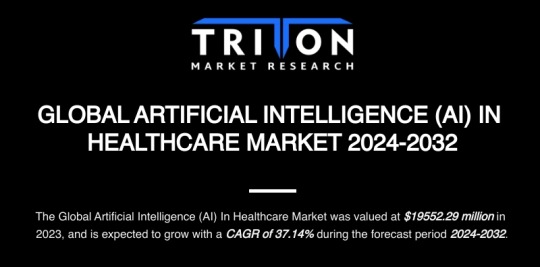
As per Triton Market Research, the Global Artificial Intelligence (AI) in Healthcare Market report is segmented by Solution (Services, Hardware, Software), Technology (Context Aware Processing, Natural Language Processing, Deep Learning, Querying Method), Industry Vertical (Pharmaceutical and Biotechnology Companies, ACOS and MCOS, Healthcare Providers, Patients, Payers), Type (Administrative Workflow Assistance, Robot-assisted Surgery, Fraud Detection, Clinical Trial Participant Identifier, Virtual Nursing Assistant, Preliminary Diagnosis, Dosage Error Reduction, Other Types), and Regional Outlook (North America, Europe, Middle East and Africa, Asia-Pacific, Latin America).
The report highlights the Market Summary, Industry Outlook, Porter’s Five Forces Analysis, Market Maturity Analysis, Value Chain Analysis, Key Buying Criteria, Regulatory Framework, Key Market Strategies, Market Drivers, Challenges, Opportunities, Analyst Perspective, Competitive Landscape, Research Methodology and scope, Global Market Size, Forecasts & Analysis (2024-2032).
Based on Triton’s research report analysis, the global artificial intelligence (AI) in healthcare market is set to progress at a CAGR of 37.14% during the forecast period 2024-2032.
AI in healthcare employs software and algorithms to mimic human perception, analyzing intricate medical data and the correlation between treatment/prevention methods and patient outcomes.
Factors such as the adoption of AI being supported by large volumes of data, increasing start-ups in AI, and government support fuel the expansion of AI in healthcare market. Biomedical and healthcare information extensively utilizes big data technologies, given the immense volume of biological and clinical data sourced from laboratories and medical research centers. This patient data requires AI-driven analysis to unveil innovative approaches for enhancing healthcare standards. Examples include advanced sequencing machines, novel software and hardware for parallel computing, and the integration of electronic health records (EHR) for comprehensive documentation of patient data.
However, cost constraints and low ROI, challenges in sustaining data security, and slow adoption of AI-based technologies restrict the overall development of the studied market.
Globally, Asia-Pacific is estimated to emerge as the fastest-growing region during the forecast market. Investments from governments, private organizations, and startups are driving growth in the region’s market. In the region, AI is primarily utilized in areas such as precision medicine and genome testing within the healthcare industry. Hence, advancements in artificial intelligence technology are accelerating the market’s growth across the region.
The notable companies in the AI in healthcare market are Siemens Healthineers AG, General Vision Inc, IBM Corporation, Koninklijke Philips NV, GE Healthcare, Microsoft Corporation, Google LLC, Intel Corporation, Medtronic Plc, NVIDIA Corporation, Oncora Medical, Recursion Pharmaceuticals Inc, and Stryker Corporation.
During the forecast period, buyers are expected to wield considerable bargaining power in the market. Google, Microsoft, GE Healthcare, IBM, and Intel are the leading revenue generators in this domain, indicating their dominance. Despite this, the market is diverse, comprising various players from regional to international levels. Currently, buyers exhibit moderate bargaining power due to factors such as high switching costs and brand loyalty.
0 notes
Text
Your Journey to Outstanding Healthcare Recruitment Starts Here
In an industry regulated tightly and under constant demand, it's crucial to discover healthcare professionals possessing the necessary skills, knowledge, and attitude to provide outstanding care and service to patients and customers. Velocity consistently fills medical facilities with a diverse range of non-clinical healthcare staff, spanning from temporary employees to permanent hires. Our non-clinical healthcare staffing solutions guarantee the efficient and effective functioning of your healthcare organization.
For more information click on the link
1 note
·
View note
Text
Artificial Intelligence Market In Healthcare - Forecast (2024 - 2030)
The CAGR of global artificial intelligence in healthcare is expected to grow at rate of 48% during 2018-2023.The driving force of global AI in healthcare is to get the better outcomes and the need to adopt the new technologies. AI in healthcare is also driven by investment across the globe. AI application in healthcare is expected to create USD 150 billion by 2026. Robot assisted surgery is estimated to the value of 40 billion USD. Virtual nursing assistants are estimated to the value of 20 billion USD.
What is Artificial Intelligence in healthcare?
Artificial Intelligence in healthcare is a concept to mimic the human brain and investigate the real medical problems and data with holistic human approach with the use of algorithms and software to find the best possible outcome. The Primary aim of AI is to find the best possible treatment or technique to deal with patient’s problem. In healthcare deep learning is becoming very important as software learns to recognize patters in distinct layers.
#Artificial Intelligence Market In Healthcare price#Artificial Intelligence Market In Healthcare size#Artificial Intelligence Market In Healthcare share
0 notes
Text
🎯 Ready to supercharge your ad campaigns? Discover how AI is transforming personalization, making ads smarter, more engaging, and incredibly effective! Check out Daniel Reitberg’s latest insights! 🚀
AI #AdTech #PersonalizedAds #MarketingMagic #DigitalInnovation #Targeting #FutureOfAdvertising Daniel Reitberg
#artificial intelligence#machine learning#deep learning#technology#robotics#autonomous vehicles#robots#collaborative robots#business#healthcare#digital marketing#marketing strategy#marketing
0 notes
Text
The global artificial intelligence/machine learning medical device market was valued at $4,011.7 million in 2022 and is anticipated to reach $35,458.2 million by 2032, witnessing a CAGR of 24.35% during the forecast period 2022-2032.
#Artificial Intelligence Medical Device Market#Machine Learning Medical Device Market#Artificial Intelligence Medical Device Industry#Machine Learning Medical Device Industry#Healthcare#BISResearch
0 notes